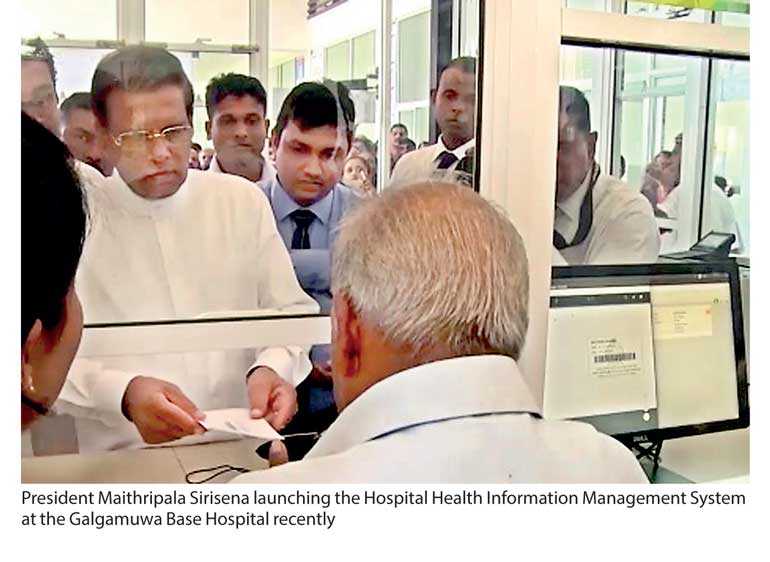Friday Feb 27, 2026
Friday Feb 27, 2026
Friday, 20 April 2018 00:00 - - {{hitsCtrl.values.hits}}
 With the Government looking to improve healthcare access for the entire population, improve productivity and reduce the burden of healthcare resources it is clear that digital health could be an answer to provide quality, affordable patient-centric care.
With the Government looking to improve healthcare access for the entire population, improve productivity and reduce the burden of healthcare resources it is clear that digital health could be an answer to provide quality, affordable patient-centric care.
Recognising the power and promise of digital health, the Ministry of Health together with support from the Information and Communication Technology Agency of Sri Lanka (ICTA) recently showcased its revolutionary Hospital Health Information Management System (HHIMS) as the first phase towards a new digitally-enabled healthcare era.
The HHIMS is part of ICTA’s Digital Health Programme which unleashes the power of technology to fundamentally reinvent how care is delivered in Sri Lanka. To date, over 30 hospitals have been transformed with the e-health system while another 50 hospitals are to undergo a monumental change through digital adoption by December. Additionally, by 2020 electronic health records would be implemented in over 300 Government hospitals islandwide.
The pioneering roadmap also outlines a range of digital health interventions to improve health services and outcomes. These include providing smart devices and connectivity to health workers at grassroots level where a total of 8,000 tablets will be provided to public health midwives and public health inspectors.
In hospitals where the system has been implemented a series of transformative processes can be witnessed with the support of the doctors, front-line nurses, patients and hospital staff.
“The number one goal of this project is to increase the patient health records. It increases efficiency and reduces patient waiting times, creating a conducive environment for patients. Importantly the doctor is also updated and knowledgeable about the patient’s previous visits and prescribes medication easily,” ICTA Programme Manager Shriyananda Rathnayake added.
Patients arriving at the Out-patients-Department receive a unique identifier which is used for all healthcare transactions.
While increasing patient reports, the system also aims to ensure it contains accurate health information maintaining accountability and guaranteeing effective use of the information.
“The goal is to contribute towards improving the quality and efficiency of the service given using the information available. Our aim to increase the medical records of at least 60% of the population of the country where all those visiting government hospitals will have a unique identification,” said Rathnayake.
Through the implementation of the HHIMS, the entire hospital is linked via one platform showcasing enhanced quality and efficiency in service delivery.
Noteworthy changes such as doctors having online access to the status of drug stocks prior to prescribing. An increased efficiency in the hospital environment is demonstrated with waiting times drastically reduced. Patient waiting time at hospital pharmacies is also reduced as the pharmacist has prior knowledge to the patients’ prescribed medication requirements. LCD counters displaying correct token numbers at most counters also promote an orderly flow.
Patients can now visit hospitals with confidence that the doctor has access to their medical records and medication assuring of easy diagnosis. Doctors too despite transferring to other locations and hospitals within the country have easy access to their own records via the system.
A novel feature of the HHIMS is the Picture Archival and Communication System (PAXC) which ensures digital radiology. Doctors have to simply request the required X-ray or CT scanner images and these are processed but not printed as per traditional methods. The doctor receives the images online with the benefit to review high-quality digital X-ray images and diagnose effectively. The cost of printing copious amounts of X-ray images is no longer a burden borne by the state.
The Digital Health Programme has also contributed towards increasing the efficiency of one of Sri Lanka’s busiest hospitals – the National Hospital Sri Lanka, Accident Ward. Incoming patients are assessed and triage information input into the system to allocate and alert the relevant doctors saving time and lives.
“Digital health initiatives rely heavily on having the right information at the right time for use by the right clinician. Throughout the project we have received the unstinted support of the health care professionals, especially the Director General of Health Care Service Dr. Anil Jasinghe, doctors, academia and all other stakeholders who are together engaging in implementing digital health across the country,” said ICTA Project Director Indika De Zoysa.